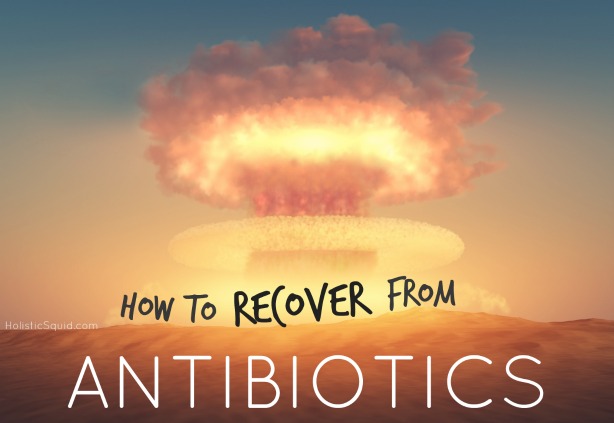
Despite my crunchy mama tendencies and over a decade working as a holistic health practitioner, I still believe that antibiotics are one of the miracles of modern medicine. I, for one, won't be passing up a chance to heal a life threatening bacterial infection if I need it.
The problem is, however, that overuse of antibiotics is a massive problem these days. In my practice my patients often receive scripts for these meds for everything from an ear ache to sinus congestion, sore throat, cough, and ingrown toenails. Now I'm not going to dispute the occasional need for pharmaceuticals, I'm just saying – antibiotics are grossly over-prescribed.
If you have taken them recently (or chronically), it's important to know how to recover from antibiotics.
The big picture of antibiotic overuse
It’s important to keep in mind that antibiotics are not effective against viruses. They are only meant to treat bacterial infections.
What this means is that for the most part, antibiotics will do nothing for your cold, flu, most of your sore throats (strep throat is an exception, but even that doesn’t necessarily require antibiotics – see my post on Natural Remedies for Strep Throat), bronchitis, and most of your sinus and ear infections. It’s true that some sinus and ear infections may be bacteria-based, but this is often not the case.
So what happens when we repeatedly reach for the antibiotics every time we’re feeling ill? The most disturbing idea is that our overuse of antibiotics may be creating superbugs.
Bacteria are ingenious little creatures. They’re one of the earliest life forms that developed on our planet, and they have survived throughout millions of years because they are brilliant at adapting to all kinds of crazy situations.
One of the adaptations bacteria can make is becoming increasingly resistant to the very drugs that we’ve designed to kill them. This isn’t just some kind of unrealistic, sci-fi fantasy. It’s a real problem with real impacts.
The CDC (Centers for Disease Control and Prevention) calls antibiotic resistance one of the most serious health threats of our time. Around 23,000 people in the U.S. die each year specifically from antibiotic-resistant infections. Many more wind up staying sicker longer because of it, often with more hospital stays that are pretty risky in and of themselves, not to mention insanely expensive.
Antibiotic resistance is even blamed for up to $20 billion in direct healthcare costs and $35 billion in lost productivity due to the illnesses it causes. Mind-boggling figures, eh? (source)
How antibiotics impact YOUR body
Aside from putting unnecessary cash into the pockets of big pharma, antibiotics can cause short and long-term damage to the human body.
We actually need a healthy balance of good bacteria in our bodies to maintain health. While there are different kinds of antibiotics that are more effective in particular circumstances, they all cast a wider net in killing bacteria (including the beneficial kind), creating a solution that brings its own problems.
The various kinds of bacteria in our digestive tract play a crucial role not only in digestion, but also immune system and overall health. When your body lacks diversity in friendly gut flora, you become much more vulnerable to a whole range of diseases and complications.
For example, in my practice I have worked with many women who suffer from chronic UTIs (urinary tract infections), an uncomfortable bacterial infection that causes frequent, painful urination, and if untreated, can lead to severe kidney infection. While antibiotics are sometimes necessary to halt the infection, unfortunately they also kill off a lot of other helpful bacteria that naturally keep yeast in check. Often these women then develop a persistent yeast infection.
Often times treatment of an upper respiratory infection (sinusitis, cough, etc) with antibiotics, leaves the patient suffering from extreme digestive upset (loose stools, gas, bloating, etc) – and only occasionally resolving the initial infection. Many of my eczema patients have a history of repeat courses of antibiotics.
Antibiotics during pregnancy can cause newborns to start out life with an altered or reduced level of healthy gut flora. Unfortunately, with 30% of births occurring by c-section, where antibiotics are routinely used to prevent infections, protecting our newborns from altered gut flora is an uphill battle (source).
Perhaps the most disturbing aspect of all this is that even a single course of antibiotics can permanently alter your gut flora. Gut flora plays a critical role resisting a wide range of pathogenic organisms, and antibiotics throw that system into disarray (source).
How to recover from antibiotics
Having said all of that, there are still going to be instances where antibiotics should be used to treat a bacterial infection. If you find yourself in need of antibiotics, here are some steps you can take to make sure you keep your body as healthy as possible in the aftermath.
Heal your gut
Take these steps to restore healthy gut flora and digestive function during and after a course of antibiotics…
- Probiotics – whether that’s through a supplement or by eating probiotic-rich foods like yogurt, kombucha, or naturally fermented pickles, kraut or kimchi. Take the probiotic during and for at least a month after antibiotic treatment. Saccharomyces boulardii is a beneficial yeast that can can help with antibiotic recovery. Read more about probiotic supplements and foods here.
- Bone broth is another important food that should be used for healing your gut. Though it may seem intimidating at first, bone broth is essentially grandma's chicken soup – made from scratch. Learn how to make chicken bone broth here and beef bone broth here.
- Avoid cold and raw foods (smoothies, juices, fruit, salads) in favor of more easily digested cooked foods like soup and simple dishes of cooked rice, meat, and veggies.
- PREbiotics – Both during and after antibiotics, it's important to focus on getting a lot of soluble fiber – which is found in foods like peeled fruits and root veggies and will feed good bacteria. Insoluble fiber, which is found in foods like whole grains, beans, and difficult-to-digest veggies, should be avoided because it will irritate your already compromised gut lining.
- Ginger – Make a simple tea by simmering fresh slices of it in boiling water and adding a touch of raw honey and lemon. This will help to gently ‘warm' your digestion as your recover from the ‘cold' nature of antibiotics.
Protect your immune system
Aside from probiotics, a few simple supplements will help your keep your immune system performing at it best, including the following:
- Unprocessed Cod liver oil. Omega 3 fats in fish oil reduce inflammation and the rich levels of vitamins D and A in unprocessed cod liver oil help optimize the immune function. I recommend this one.
- Vitamin D. Regular sunshine on your skin (without sunscreen) is the best way to get this important immune supporting nutrient. If you're feeling under the weather, a high dose of vitamin D3 for no more than three days has been shown to halt or at least greatly reduce the symptoms of an infection. Read more about vitamin D here.
- Plenty of antioxidants by consuming fresh, seasonal fruits and vegetables daily. If you need an extra boost, you can take extra vitamin C or another antioxidant-rich supplement – read more about sourcing and dosages in this post.
If you do get sick again
Consider safer and often equally effective treatments first, rather than running for antibiotics with a knee-jerk reaction to illness.
Support your immune system with the points mentioned above. Additionally, Chinese herbal medicine can be extremely effective in resolving various types of infections both bacteria and viral.
One of my newer favorite tools is colloidal silver, which can take on a wide range of microbial organisms. Like antibiotics, it doesn’t distinguish between the good guys and the bad guys, but it is less harsh than traditional antibiotics when used only on occasion. For more on colloidal silver, see my article Is Colloidal Silver Safe?
In what ways have you suffered from the after-effects of antibiotics?



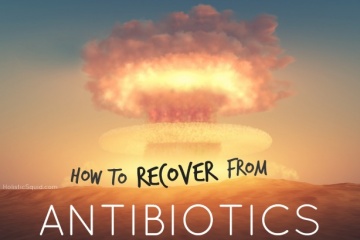
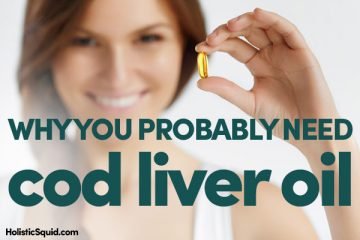
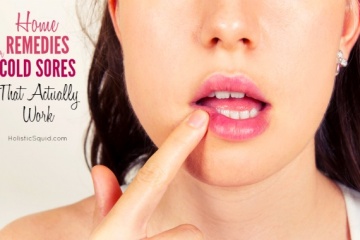
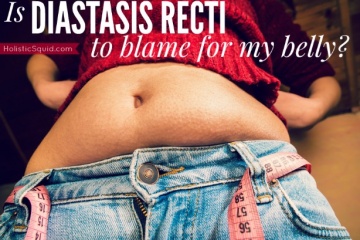

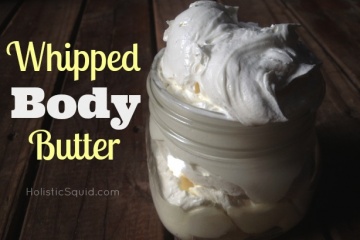


Our son was on antibiotics as well as a plethora of other medicines while in the NICU upon birth. Necessary, yes probably…but the aftermath was crazy! He had itchy, oozy, red, dry skin. He itched like crazy sometimes had bad breakouts depending on certain foods that I ate (I nursed him). It was miserable! Finally we had enough, did some research and came across the concept of leaky gut syndrome and how this was potentially causing major problems from the inside out due to his lack of good bacteria. This was the beginning of a whole new world for us– a much more holistic lifestyle approach with not only food, but our environment as well. After we did an elimination diet, started giving him FCLO and probiotics, started eating a better balanced traditional diet, and began using only coconut oil and tallow balm on his skin, we can now say that he is a whole new child. Finally has soft, baby skin and he is two now! It took months of frustration and sad itching, but we defeated it in the end!
Hi Leah – Thanks for sharing your experience! I’m glad it worked out in the end. 🙂
My 22 month old has an ear infection. Despite my crunchy remedies and immune boosting supplements and food, she still spiked a fever three days after the diagnosis. So we started the round if amoxicillin and are giving her biokult, yogurt, and stock/kraut juice. I wanted to possibly add Saccharomyces boulardii as well. Is there a brand that you prefer for children? Jarrow or florastor come to mind but wanted your input. Thank you!!!
Hi Kate – Thanks for your comment. You can read my probiotic recommendations here: http://holisticsquid.com/probiotics-no-excuses/
I have used St. Francis Ear Oil and it has worked for me as well as 5 others to completely get rid of the ear infections 100% of the time! All the best! And thanks Emily for your great blog!
According to this research. American Biotech Labs ASAP Silver Solution (a nano-silver) does not harm the gut flora at all. http://lifesilver.com/v1/VIRIDIS_Probiotic_report.pdf This particular company has a lot of studies behind it.
Thanks, great article- so helpful and necessary for many of us. 🙂 Pinning!
My 8 month old is on antibiotics for a strep rash that, despite my efforts, would not go away and began blistering. I am worried about the repercussions as a result of the antibiotics. What would you recommend for an infant this age? Should we do probiotics, broth, and cod liver oil and is it too early of an age? She eats very few solids and is mostly on breast milk at the moment.
I have a sliver in my toe that a doctor tried to remove in August but couldn’t. She said she thought it might work its way back out on its own. Recently it became sore and infected and I went back to the clinic. Another doctor told me he couldn’t try to take it out while it was infected and I would have to take an antibiotic. I told him I have spent the last twenty years trying to repopulate my intestinal flora and recover from the damage done from antibiotics I took as a teenager, and that I was not going to take an antibiotic. He said if the infection spreads, I could lose my toe or my foot. I was pretty scared.
Coincidently, however, I had just learned about and ordered lactoferrin, which has many health benefits, one of which is clearing up infections. I decided to try it before succumbing to the doctor’s orders. It has been at least a week and the infection is gone from my toe. I think the sliver may still possibly be in there, I can still feel something, but the swelling, redness and pain is completely gone. And no antibiotics. I did put colloidal silver on it using a cotton ball for several evenings, that might have helped, too.
I’m not telling anyone what to do medically, but this is what I did for myself. I have taken excellent probiotics for years and I don’t think there is a way to rebuild intestinal flora to the way it should be once it has been wiped out by antibiotics.
Hi Marilyn – Thanks for sharing your experience, and I’m glad it’s working well for you so far. 🙂
I, unfortunately, was overdosed on antibiotics as a child when I had several infections. My mom didn’t know any better, back in the late 80s it was the norm. Ruined my immune system and digestion. My kids have never had antibiotics and we use colloidal silver if there is a need – it has cleared both an ear infection (happened only once) and a gum line infection. Does the same thing, except without the horrible side effects! I give them probiotics afterward of course. 🙂
What about group B? I am pretty sure I will test positive again this pregnancy and my midwife is really pushing for abx in labor because of how dangerous it can be to baby. I really don’t want this done and am happy to use suggestions if I follow through with abx but what about baby. Will all the probiotics and bone broth follow in my breast milk? What about gelatin for gut healing as well?
I knew about the dangers of antibiotic overuse, but this post was a good reminder. I take antibiotics for my acne and I really want to stop taking them, but I am so scared of my acne getting out of control again. I eat a real foods diet and take NDT for my hypothyroidism, but without the antibiotics I get horrible breakouts. I do take probiotics and gelatin daily, but I will start following the cooked foods, prebiotics and ginger recommendations.
Thanks for the informative post!
What about situations like PANDAS/PANS or Lyme where drs typically prescribe long-term antibiotics?
Thanks for this. I have Lyme and expect to be on different antibiotics for a year. Tried all other ways, and still chronically ill, most likely because of the bio film. I am going to try essential oils as well.
May I also suggest acupuncture. It really does help the immune system.
In regards to getting vitamin D from the sun, how do you feel about tanning beds? Winter is a huge downer for me here in the south and getting outside in the freezing cold is not a pleasurable experience . Do you think tanning beds are bad even if you aren’t getting burned?
Hi Hayden – Thanks for your question. You can read how to get Vitamin D during the wintertime in this post: http://holisticsquid.com/how-to-get-vitamin-d-in-winter/
Is there anything I can do at home for a yeast infection?
I ended up in hospital with a chest infection which turned out to be viral but they had me on a few different antibiotics which was obviously unnecessary due to it being viral. My recovery was fine but I was breastfeeding my 4 week old at the time and she went on to develop eczema and allergies. If I sat her on the grass her eyes would stream with tears instantly and she’d sneeze constantly. She also had a persistent eczema rash around her eyes and mouth that just wouldn’t go away. I knew that with time and the right foods I could work it out and get her health back. From 6 months old I gave her flaxseed oil and probiotics every day (she was slow to come to food so I was unable to introduce fermented foods until she was older) by the time she was 7 months old her eczema was nearly gone and so were her grass allergies. By 8 months it was like she never had any allergies at all and now at 21 months she’s still a allergy and eczema free little girl who rarely comes down with a cold and never needs to see a doctor. The power of nutrition never ceases to amaze me.
I received antibiotics during pregnancy Due to my urinary tract infections. I also received antibiotics during delivery. I read that antibiotics given to mother can affect the fetus digestive system as well. How do I help my infant with his digestive flora. He seems to have some issues with digestion sometimes.
Hi Mari, thanks for your question. You would need to help him balance out his gut flora. This is a great probiotic for infants. I hope this helps.
I was on Clendamyasin for 2 months to treat a stubborn sinus and ear infection that would not respond to regular antibiotics. A week after finishing the Clendamyasin I ended up with Closridium difficile colitis (C. Diff). My life has never been the same. I had 8 reoccurrences of C. Diff before finally getting rid of it, loosing over 40 lbs. To date, I am unable to work due to post C. diff complications from the damage done to my GI tract. It has been 3 1/2 yrs since I first got C. Diff. I am now very susceptible to getting it again. I have been trying any and all alternative medicine I can to treat my current condition. It would have to be a life or death situation for me to use antibiotics again!
Terrible, terrible. I feel for you. I have never heard anyone have 8 reoccurences. Ouch. I too had CDiff and was put on Vancomycin. I DESPISE antibiotics. They really mess you up. I have been on/off them for 21 yrs because I am susceptible to UTI’s. Probiotics does help. I take really strong stuff called #VSL #3. Pricey and you need a script, but run it by your gastro. It is normally prescribed for IBS people. It has over 500B organisms. I am thin too. Working on getting my weight back. Hope you get better.
How many weeks/days do you suggest one should follow your plan of action after a session of antibiotic use? Specifically when can one return to a more normal diet and not have to avoid cold or raw foods?
Hi Magdalena, generally about a month but it totally depends on how you feel. If you feel you are “back to normal”, then you can eat the way you normally would.
Help, I am 11 weeks pregnant with a chronic uti (I have had for years) and Dr prescribed me low dose antibiotics for my whole pregnancy (250 mg 2/week). I know it’s a very low dose but I am so scared to tale it to arm the fetus.
I am taking to S of probiotics and waiting to reach the end of my first trimester to start the antibiotics.
How can I limit the “damage”?
Thanks for any suggestions.
Hey Mika,
You have a good reason to worry. A baby’s first 1000 days (which is pregnancy + first two years) are critical for brain, gut, and immune development.
Microbes impact ALL of these areas – baby’s brain, gut, and immune systems. And as this article points out, antibiotics kill microbes…the bad and good.
Besides that, months of antibiotic use will ENCOURAGE antibiotic resistance, which is what happens when bacteria genetically adapt to the antibiotic and become resistant to the drug.
Prescribing antibiotics over the length of a pregnancy is incredibly reckless, in my opinion – especially given what we now know how critical microbes are to our overall health and baby’s development.
The not-so-good news: Probiotics cannot undo the damage of antibiotic use. They can help. But the microbes living in your gut are far more complex than what you will find in any probiotic.
The good news: You can 100% get rid of a UTI (even one that you’ve had for years!) with Chinese herbs. Antibiotic drugs will ultimately weaken your ability to fight infection. Whereas the right Chinese herbal formula will strengthen your immune system while getting rid of infection by killing microbes and tearing down the biofilm that protects them and makes recurring infection possible.
Before I got pregnant with my second baby, I had a recurring UTI that lasted for a couple months. And hints of it came back during my first trimester. Changing my diet and getting rid of added sugar was a big help. I also took Chinese herbs.
If I was in your shoes I would continue taking probiotics, since a chronic UTI indicates your vaginal flora may be unbalanced. And because I would want to protect my baby’s development, I would find an acupuncturist to work with and begin taking a Chinese herbal formula instead antibiotics.
Hope this helps and let me know how things go!
Emily xoxo
I was given a prescription of cipro 500/day for 30 days on a preventative measure. I wasn’t tested for UTI or any other infection. I went to see urologist because I felt a sporadic sensation in my testicle and sometimes it felt like it went up to my bladder. He saw nothing wrong and had me see a radiologist for an ultrasound. Radiologist/doctor saw nothing abnormal. Called back doctor after 2 weeks to see if I still need to take cipro and never got a call back.
Started feeling cramps in my gut, my shoulders started aching while i was training and I started feeling down. I was depressed. Couldn’t get a hold of a doctor because this is all happening during Christmas holidays. I felt miserable!!! Pharmacists thought I was crazy because I told them the story. They couldn’t believe I was prescribed cipro without any tests confirming an infection. They told me to take probiotics daily and zantac for heartburn. I completed the course of treatment while I was away on vacation and it demoralized me and affected me physically and mentally. All the sports injuries I had when I was younger have come back to haunt me. Both my shoulders ache, my knee is bothering me and I can’t fall asleep at night with the help of zopiclone 🙁
This is how I feel 3 weeks after ….
cipro is poison….I took it for 3 days (a few years ago) and felt out of whack for quite some time.